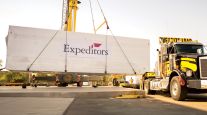Senior Reporter
SmartWay Seeks to Involve Additional Shippers, 3PLs

This story appears in the April 17 print edition of Transport Topics.
ORLANDO, Fla. — Greater involvement from shippers and third-party logistics providers is an important next step for realizing the freight efficiency goals at the heart of the Environmental Protection Agency’s SmartWay Program, an agency representative said. And some are taking a look at the program.
“We have been trying to reach out more to shippers and take it to the next step and encourage collaboration with their carriers,” said Denise Kearns, an environmental protection specialist with the SmartWay Transport Partnership at EPA. “They need to understand how their freight is being moved.”
Kearns noted that SmartWay, which launched in 2004, has a track record of accomplishments upon which it can build.
“We are moving ahead,” she said. “I know we have had changes with the [presidential] administration, but it is an effective program. Hopefully the results of the work that we have done will speak for themselves.”
The SmartWay program has about 4,000 partners, including about 300 shippers, she said. She added that about 500 3PLs are in the program.
SmartWay helps companies identify and select more efficient freight carriers, transport modes, equipment and operational strategies to improve supply chain sustainability and lower costs from goods movement, according to EPA.
In the U.S., transportation accounts for a little more than 25% of all carbon emissions, including nitrogen oxides and particulate matter. Freight activity is the fastest growing source of these emissions, she said.
Kearns made her comments during a session on sustainable freight during the NASSTRAC 2017 Shippers Conference and Transportation Exposition here April 9-12.
After the session, one 3PL that is a SmartWay member said its business model focuses on loading otherwise empty trucks with backhauls.
“The fewer trucks we put on the road, the fewer emissions, obviously,” said Michael DiEgidio, a business analyst with PrivateFleet Backhaul, a 3PL based in Anderson, Ind. “We are using current trucks that are running empty miles. We use those empty trailers and find some freight lanes to fill them.”
Asked if involvement with SmartWay was a selling point with customers, he said, “Shippers actually do look at that. It’s not necessarily a selling point, but it is an asterisk. But the more people that can be conscious of the environment and what we are actually doing in this industry [to help], the better off we are,” DiEgidio told Transport Topics.
A session attendee said he was looking at SmartWay as a means of organizing shipment-related data for an Orangeburg, S.C.-based company handling wood products.
“I am going to take this back to our organization. We are growing very fast,” said Chad Russell, director of logistics at Cox Recovery, which offers wood disposal services and is a division of Cox Industries Inc., which manufactures and distributes pressure-treated wood. “[The company has] done a very good job of adding customers and making acquisitions and basically swallowed the industrial utility pole market. The logistics has always been handled, but it needs some help,” he said, adding that the company is the largest producer of utility poles in the nation and runs two dedicated fleets and uses a flatbed carrier, too.
Cox also has begun a new business to reclaim utility poles after their useful life, Russell said. It is approaching customers saying that the new service “is a logistics play.” Cox has trucks onsite delivering new poles and they are going back empty to the plant, he said.
“About 60% of the recovery is transportation-based. It is getting the equipment there and moving it to where it needs to go to be disposed of or processed,” he said.
SmartWay might be a way to begin to segregate and better understand the efficiency of those operations, Kearns told Russell.
“Certainly a transportation management system is going to provide much more detail. But SmartWay does break down the different types of fleets and the vehicle miles traveled and the fuel used by each of them,” among its other features, she said.
SmartWay offers a hotline, (734) 214-4767, No. 3, for those seeking information on aerodynamic equipment, designation of SmartWay tractors or trailers, rail, idle reduction technologies, tire verification or inflation systems and just general information related to the program.
Kearns noted, “Companies are now starting to see transportation as really important to the overall value of their supply chain because transportation is functioning as a much more direct line to consumers.”




